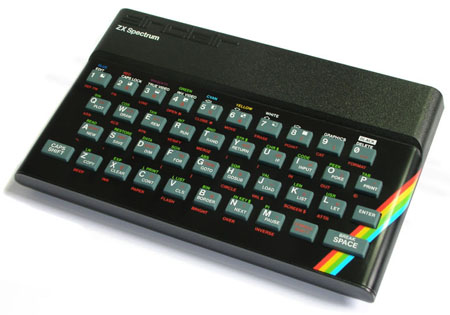The ZX Spectrum is 30 today, making it a few months younger than I am.
Apparently, the Spectrum was the first home computer to break into the mass market in the UK due to its low price-point and decent catalogue of software. But I didn’t know any of that at the time.
I don’t remember when we got our Spectrum, but I vaguely remember that we didn’t have one and then at some point we did. I don’t think it was new when we got it, and it wasn’t our first computer – there was an old Commodore PET in a cupboard that I had never seen. The Spectrum was a tiny thing, with its famous rubber keys and assortment of wires.
(years later, when I was aged 8 or 9, I remember having an argument with my schoolfriends who insisted that the keyboard of a PC was only a keyboard and that the computer was a big box that the keyboard plugged into. I told them they were being ridiculous. If my old computer was small and fitted in a keyboard surely, I argued, the modern computers of 1989 would have been even smaller).
It had to be hooked up to the TV using a special output cable. Software came on audio-tapes but It didn’t have a tape recorder built in – we had to connect one to it using a line-in cable. The joystick (and we used an old Atari 2600 stick at first) had to plug into a special Kempston card that had to be plugged into the machine. If anything was knocked or dirty then it all wouldn’t work.
Loading a game took time – from a minute for a short one to several minutes for a long, new one – and if a tape had more than one game on it you had to fast-forward it first. Then we’d hear the famous loading sounds – the low header pulse while the screen’s border flashed cyan-and-red, followed by the high-pitched screeching data sound while the screen-border went yellow-and-blue. And when it was finally done we could play a game. If we were lucky. If we were unlucky we’d have to start again.
I remember playing games with my Dad – the old text-based adventures at first, like the Hobbit and the Hitchhikers’ Guide, both famously hard, and the classic Batman game. I remember the excitement when we got Elite, and the frustration when the special Lenslok copy-protection meant we had to look at the screen though a special piece of plastic to play the game – and it didn’t work so we had to get a new one. Eventually I got and played my own games: the Dizzy series, Mercenary, Rainbow Islands, even Tetris with its eerie music (not the Russian music you know from the Gameboy – this music).
We had all these old computer magazines, and some of them had programming tips in them. I started writing BASIC programs young; I even wrote a sort-of-functioning version of a game a bit like Snake. We bought a game that let you make other 3d games for the Spectrum. I played with it for hours but never made a game that worked.
I also bought the classic magazine Your Sinclair, famed for its sense of humour as the Spectrum gradually slid towards obsolescence. The sarcasm, surrealism and self-deprecation I learnt from YS have served me well in life.
At some point we bought a newer Spectrum – with a built-in tape recorder – and we scoured carboot sales, buying up tens of games for a pound as people sold off their old tapes.
Eventually we got a Sega Mega Drive and a SNES and we put away the Spectrum for good. But, 30 years after its release, I realise how much it changed my life. I learnt how to program, how to play co-operatively and how to read technical manuals, and I think back to those Sunday mornings watching my Dad play Elite and remember what a good time it was (of course, these days he still plays more computer games than I do).
I leave you with this video which reminds me of the Good Old Days.

Ahhh, the good old days! I remember loading every new game expecting something new and not yet seen. Unfortunately my native tongue isn’t English so many details just went over my head at the time, but still I had a happy childhood with the Spectrum. The keyboard and black paint got all worn over the years, so I had a friend mount my Spectrum on a wooden board together with a ‘real’ keyboard taken from a broken TI99/4a. I learned how to program in Basic and even won some school competitions. Then came the Amstrad CPC, then Atari ST and finally the PC. But I still have fond memories of the eighties. BTW I’m forty.